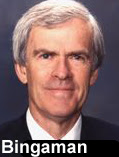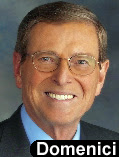 The most definitive report yet on the cause and predicted effects of global warming comes at a time when
The most definitive report yet on the cause and predicted effects of global warming comes at a time when
The report will also likely be cited by Gov. Bill Richardson as he campaigns for president. One of
The lengthy report from a United Nations panel made up of hundreds of scientists from 113 countries, including the United States, issued a bleak report today that found that global warming is “very likely” caused by human activity, which means the scientists behind the report are 90 percent certain.
If nothing is done to curb greenhouse gas emissions, the global temperature could increase as much as 11 degrees Fahrenheit by 2100, the report found. More than a million people could die as a result of global warming, and the costs could rise to several billion dollars.
The best-case scenario – if the world gets greenhouse gas emissions under control quickly – is an increase of 3 degrees Fahrenheit in the next century, the report states.
The scientists predict that sea levels will rise between 7 and 23 inches by 2100, though recent surprising melting of polar ice sheets could add another 4-8 inches to that estimate.
The worst-case scenario includes the eventual melting of
The scientists said humans have already affected the world’s climate enough that higher temperatures and more extreme weather will become the norm over the course of the next century. Drought will become increasingly common in the
You can read more about the report from the Associated Press by clicking here.
A bipartisan search for solutions
Earlier this week, the liberal group Environmental Defense named New Mexico’s two senators, Democrat Jeff Bingaman and Republican Pete Domenici, as two of the 10 “movers and shakers” on U.S. climate policy.
The two worked together last year to organize a conference at which business leaders spoke in favor of
When I met with Bingaman last month in
“Congress wants to act,” Bingaman told me. “We hope the White House will act.”
Bingaman’s office is in the process of circulating draft legislation, along with Sen. Arlen Specter, R-Penn., that would cap emissions and allow the trading of usage permits, which Bingaman told me he believes is “the most significant action we could take to begin dealing with this issue.”
In a statement released today, Bingaman said his staff is working with Specter’s to “convene a series of workshops and stakeholder briefings to identify and work through the key issues that need to be addressed in order to have a proposal that is worthy of broad bipartisan support in the Senate.”
Bingaman also said in today’s statement that he’s working with Senate Environment and Public Works Committee Chair Barbara Boxer, D-Calif., to “pool the experience of our two committees to find the best approach in the Senate.”
The new report “underscores the increasingly serious threat of global warming” and is “one more reason why this Congress will be equally serious about passing legislation this year,” Bingaman said. “I would like to see us pass a bill and have the president sign it. We need to start taking action – we cannot afford to keep kicking the can down the road.”
Domenici’s office did not immediately respond to a request for comment.
Bush opposes mandatory caps on emissions
President Bush proposed setting mandatory fuel standards and cutting gasoline usage in the
Though the United States is responsible for 25 percent of the world’s emissions of carbon dioxide and uses 25 percent of its crude oil, U.S. Energy Secretary Sam Bodman said at a news conference today that there needs to be a “global discussion” on what to do about global warming because the United States is “a small contributor when you look at the rest of the world,” Reuters reported.
Still, Bodman said, the Bush Administration agrees with the report.
“Human activity is contributing to changes in our Earth’s climate, and that issue is no longer up for debate,” he said.
As for
“In

